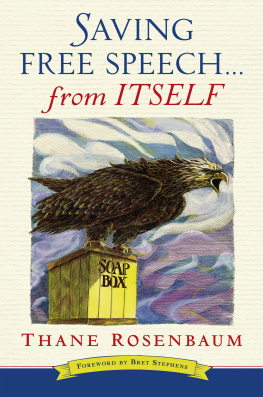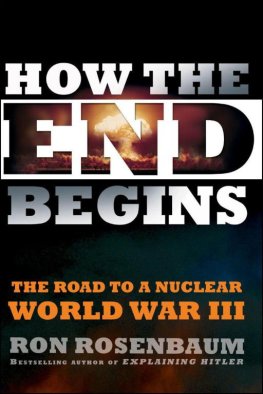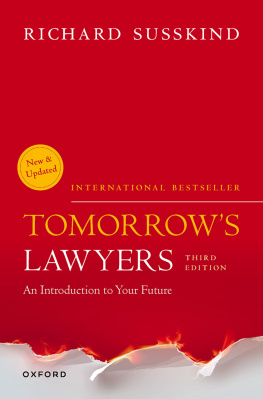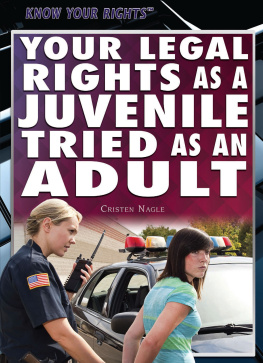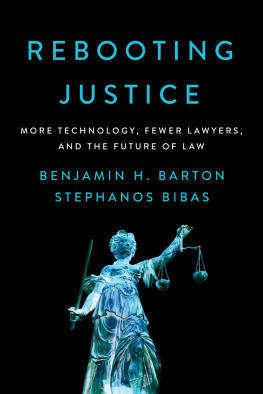THE
MYTH
OF
MORAL
JUSTICE
Why Our Legal System
Fails to Do Whats Right
THANE ROSENBAUM

For Carol and Seymour, Tom, Ellen, Sam, and Basia Tess
[I]t never occurred to the lawyers that they should suggest or insist on any improvements in the system.
Franz Kafka,
The Trial
Contents
L ike most people, I have mixed feelings about the law, and the judges and lawyers who serve it. Of course Im relieved to know that we have laws, yet I would prefer that the legal system shine its light elsewhere, anywhere but in my direction. Im interested in legal trials, but really only from a distance. I dont want to be a party to any action, and yet I would like to know that the courtroom is available to me should I ever have a grievance that cant be resolved any other way. Like an unloaded gun, the law can both offer peace of mind and serve as a weapon of destructionto both body and soul. It is reassuring and forbidding, alluring and dangerous, restorative and crushing, all at the same time.
I had once been a Wall Street lawyer myself, as well as a law clerk to a federal judge, and the editor in chief of my law review back when I was in law school. On a few occasions, I have also had to be a litigant. I have a solid, if in some ways ambivalent, legal background. I am not impartial to the courthouse, or dispassionate about what happens there. Justice isnt truly blind, and neither am I.
Today, Im not really a lawyer at all. I dont admit to even being one; in fact, I qualify and marginalize my legal associations to the point where my law degree seems trivial to my existence. I act as though I am ashamed of the pedigree, stigmatized by the scarlet letters that form Esq. Maybe Im simply a recovering attorney, someone who has had to modify his behavior so that his days are less morally compromising, and make more sense. A professional trained in the art of arguing, hair-splitting, and loophole-seeking, I am now simply trying to make amends.
I regard myself primarily as a novelist and cultural essayist, yet I also teach courses in human rights, legal humanities, and law and literature. Perhaps the part of me that writes serious fiction feels antagonism toward the moonlighting law professor. I am in the middle of my own internal rivalry, two mindsetsone for the novelist, a different one for the lawyerat war with themselves. The lawyers perspective is one I can and prefer to live without, while I am overly protective and proud of what I consider to be my more soulful side, which I associate with the artist in me. For this reason, I feel as though I am stuck in two seemingly irreconcilable worldsthe storyteller who depends on the imagination, emotion, nuance, and the uncertainty of direction; and the lawyer, whose world is increasingly narrowed, isolated, cut off from the human experience and focused far too much on achieving prescribed, predictable results.
I surely understand why people are cynical about lawyers and the law. Novelists and artists in particular have had a long history of looking critically at what the law can do to individuals hapless enough to be caught within its slow-moving, soul-murdering gears. Yet, as a lawyer, I am also an insider, someone with working knowledge of its best and worst values, and the considerable benefits the law can bring to any society. I know all the secret handshakes, the smoke signals, the shorthand that is attached to the long arm of the law. I have insight into why the law does what it does when it does itits self-justifying rationale, its self-references and organizing principlesand for this reason, I am unsurprised by, although keenly sympathetic to, situations in which the law comes across as unjust and quixotic, when its results dont feel right emotionally to those who are neither its insiders nor cast members.
We are all in some ways resigned to having conflicting emotions about the legal system. It is our burden, the consequences of submitting ourselves to an institution that promises order in return for some measure of sacrificed freedom. As human beings, we draw comfort from knowing that we are all bound by rules, that our external conduct is not limitless, that the daily collisions and accidental encounters of life are not without boundaries. Rules are supposed to make us feel safer. We are better off knowing that some lines cant be crossed, and that certain kinds of behavior wont be tolerated by a civilized society. There are promises and duties that must be honored. For those who test the contours of these restrictions, there are punishments and liabilities, jail sentences and damages awarded against them. Boundaries, by design, manage to keep most people in line. This is good for everyone, because without the law, nothing could prevent lawlessness, frontier justice, self-help remedies, disputes resolved only by way of bullies, bullets, and blood. And who would want to live in a world like that?
There is almost a primal sense, or perhaps it is simply an unconscious shared wish, that the law be a steadying force in our lives. We want our justice to be just, and that it be totally blind to bias and prejudice. The law should offer moral lessons that make sense. We want our judges to be wise and our lawyers honorable. Travesties cause people to enter the courthouse in search of justice. A travesty is not what they should find when they get there.
We need to know that some higher authorityone that is not divine, celestial, or mystical, but rather concrete, temporal, and justis empowered to sift through the maze of human interactions gone wrong, punish those who went too far, compensate others for their material losses, and find some measure of rough justice for the rest. We ask that our courts provide forums so that we can speak about the harms done to us, the property taken away, the promises broken, the duties and obligations ignored, the responsibilities placed in the hands of the irresponsible. Most of all, we need to know that some empowered entity will be there after the accidents, not to gawk but to provide remedies, to set things right again, or as right as theyll ever be. We can all breathe easier knowing that we are protected from the violators among us, and from our own rash desires for vengeance.
But sometimes our interest in the law is not merely personal. At times the law serves a communal function. The moral foundations of civilization are more grounded and stable when truths are acknowledged, stories are told, and lies exposedall out in the open. What makes trials different from star-chambers and confessional booths is the moral necessity of having the public witness the outcome. We are somehow better off by having participated in the experience of watching a conflict resolve itself, a punishment handed down, a judgment rendered and received. In the best of these circumstances, we allnot just the parties to the actionlearn a lesson.
Yet aside from the gains made on moral capital, there is also the lurid fascination that so many share in the freak and peep show of the courthouse. There is endless, often mindless, cultural obsession with the law, and the intensity of these feelings invariably transcends abstract notions of the law as a provider of freedom and security. This kind of infatuation falls not within the province of legal philosophy, but rather human curiosity, the vicarious thrill that people receive from witnessing the law. It is the joining of the emotions and the imagination, all in the hope of making sense of the human experience.
Sadly, this is an unreciprocated, one-sided enterprise, because judges and lawyers are not driven by the same human impulses. The law and its practitioners simply wish to streamline the system in search of the bottom line, to move cases along, to create a process that allows rules to develop and precedents to evolve, and, most important of all, to achieve the correct legal result. Legal, and not moral, outcomes occupy the legal mind. But the public cares little about the efficiency of court administrations and the evolution of legal rules. People look to the law to provide remedies for their grievances and relief from their hurts, to receive moral lessons about life, to better themselves and their communities. What most people dont realize is that judges and lawyers are motivated by entirely different agendas and mindsets.
Next page

